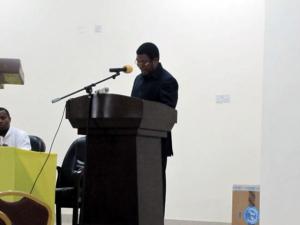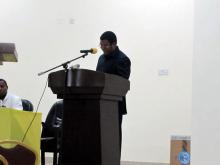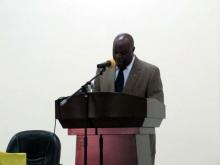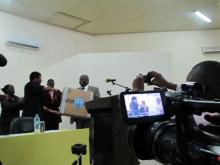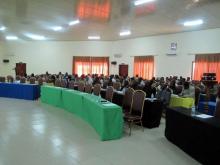Launch of model districts for Peer Learning: An initiative for strengthening district health services, in Dodoma
On 11th September, 2012, the Government of United Republic of Tanzania (Ministry of Health and Social Welfare (MOHSW) and Prime Minister’s Office Regional Administration and Local Government (PMO-RALG)) in collaboration with the WHO Country Office officially launched the initiative to strengthen district health services in Tanzania. The launch was officiated by the Deputy Minister PMORALG, Hon. Kassim Majaliwa (MP) in Dodoma.
Others present at the launch were the Ag. Permanent Secretaries from the two Ministries (MOHSW and PMO-RALG), the Chief Medical Officer, Regional Medical Officers, District Executive Directors, District Medical Officers, District Health Secretaries, Officials from MOHSW and PMORALG, Chair of the DPGHealth, WHO Country Representative, Dr. Rufaro Chatora, Representatives from UNICEF, USAID, SDC, WCO staff, and members of the media.
In her welcome remarks the Ag. PS PMORALG, Mrs Salome Musese emphasized on the pertinent role of the government in spearheading the initiative to improve health service delivery in the districts. She further reiterated the objectives of the two days meeting and called on to participants to actively engage in the discussions on key matters to be addressed in the implementation of the initiative.
In his speech, the Guest of Honor, Hon. Kassim Majaliwa announced the government’s commitment to the initiative and further appreciated contribution and commitment by the Development Partners in strengthening health services delivery in Tanzania. He further underscored the importance of strengthening RHMTs and CHMTs through capacity building in planning and management of health services, highlighting leadership in strengthening community access to priority health services.
The WHO Representative, Dr. Rufaro Chatora delivered a presentation detailing challenges to be addressed in the area of health service delivery and acknowledged the commitment of development partners in supporting health services in the country. Furthermore, he elaborated on the need to demonstrate that with good management and efficient use of resources, it is possible to get better evidence based health outcomes. He went on to describe how the initiative could be monitored and evaluated. The WR concluded by outlining support that would be available to the model districts as follows:
(a) The initiative will be jointly coordinated by the MoHSW and PMO-RALG,
(b) Implementation will be through existing structures (i.e. Regional and District Health Services in the two Ministries)
(c) Regular field visits will be made to the districts to assess progress and provide guidance to address challenges.
(d) Some financial resources will be availed to bridge identified gaps
(e) Partners will be identified to focus on specific districts.
The meeting proceeded with presentations and panel discussions on a number of key issues including:
- Strengthening district health services
- Communicable and non communicable diseases
- AIDS, TB and Malaria Services at District level
- Immunization Vaccines Development (IVD)
- Improving Maternal, newborn, child, adolescent and Nutrition health services at District Council level
- Human Resource and Health Financing issues at the LGAs
- Essential Medical products, vaccines and technologies
- Infrastructure development
- E- health
- Update on Planrep tool for planning and data collection arrangements
- Supportive supervision
- Monitoring and evaluation
Launch of model districts for Peer Learning: An initiative for strengthening district health service




